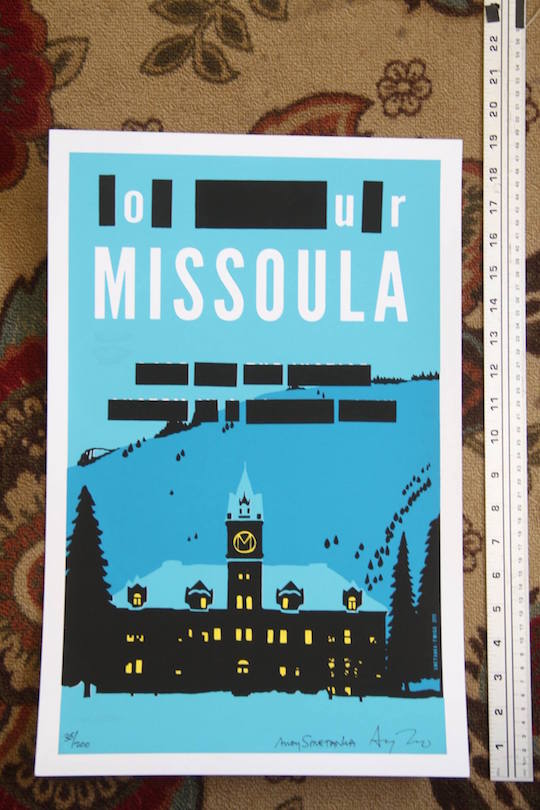Perhaps you have not read about this issue in your hometown newspaper for the last month, but Jon Krakauer’s book Missoula: Rape and the Justice System in a College Town came out yesterday. I am about halfway through, and it is a gripping read. Plenty of local luminaries assured me it was garbage, including Griz correspondent Bill Speltz—who two months ago insinuated that Krakauer was biased and his book misleading, before adding that he would “hold judgment on Missoula until reading it”—and county attorney Kirsten Pabst, who criticized Krakauer for not interviewing her and wrote a memo to Doubleday calling the book “actionable libel.” I quote the Missoulian:
“Pabst did not appear to have obtained a copy before writing the memo; she appeared to be responding to information she had received about the publication, including questions she received from Krakauer in connection with his reporting for Missoula.”
That makes it sound like he tried to interview her. Also, guys: I know you love Missoula, and I do too. But you have to read a book before you determine that it’s a hit job. So far, I find Missoula striking not just for its descriptions of how this town has mishandled rape, but also for its generosity.
Obviously, that contradicts what a lot of people are saying. In her letter to Doubleday, Pabst wrote that Krakauer “has not spoken to most of the people he intends to destroy.” Certainly, the author seems to have a low opinion of her work. But one of the most notable aspects of Missoula is how infrequently Krakauer’s opinion appears.
The book focuses on a half dozen rape allegations in Missoula between 2009 and 2012. Krakauer presents these narratives from the victims’ perspectives, beginning with their own accounts of the alleged assaults. These in-person interviews with traumatized young women—many of whom feel ill-served by the criminal justice system—could easily reflect bias against local police and prosecutors. There is room to tell a misleading story there. But once these victims make contact with police and courts, Krakauer draws most of his narrative from official transcripts.
These transcripts make a lot of people look bad. Detectives keep asking women with rape complaints if they have boyfriends, observing that lots of times, women cheat on their boyfriends and then call it rape later. From a cop’s perspective, this is a statement of experience, a commiseration about how hard it is to do police work. Of course, to the victim—and to the reader—it sounds like an accusation.
Before trial, a county prosecutor warns an alleged rape victim that she will be “torn apart” on the stand. From her perspective, she is preparing a first-time witness for the kind of emotionally destructive cross-examination she sees day after day. From the victim’s perspective, though, this kind of pep talk is terribly discouraging.
Time and again in Missoula, well-meaning police and prosecutors tell victims how hard it is to pursue a rape case, how difficult it will be for them if they go to trial, how unlikely it is to secure a conviction. These are well-meaning people who are trying to do good, but they wind up systematically discouraging rape victims from pressing their complaints.
Krakauer could have written a book that presented these people as malicious. He could have portrayed local cops and prosecutors as a cabal of good old boys who love rape and the Griz. But he did not. Consistently, he presents these people as well-meaning, skilled professionals who try to do the right thing but make destructive mistakes.
That sounds like a true story to me. “Missoula conspires to hush up rape” does not. “Krakauer lies because he hates our town” doesn’t sound right, either.
The real world is not full of prosecutors who work for criminals or journalists who try to destroy their subjects’ lives. It’s full of well-intentioned people who make mistakes—for example, when Krakauer claims that people call Missoula “Grizzlyville,” or when Pabst says he didn’t try to interview her and that she knew he was biased from the questions he sent.
You should read Missoula. It’s a book about how smart people can build a bad system by trying to do the right thing. It’s about things that happened in our town, but it is not about what assholes we are.
In the first chapter, Krakauer makes it clear that Missoula does not see any more rapes than other college towns of its size. He says it several times, and he cites statistics. What’s shocking, he writes, is not that Missoula sees an inordinate number of rapes or that we handle them especially badly. It’s that what happens here is par for the course.
The town seems to have united against Krakauer’s argument, even if most of us haven’t read it yet. That’s because people here are pretty convinced that Missoula is special. The whole point of Missoula is that, at least in the area of sexual assault, we are not.





hello..i would like to hire you to write some things about my story here.i need to be in voice contact.or in person.cuz i have a disability with writing.thank you
Have you been to Dismaland?